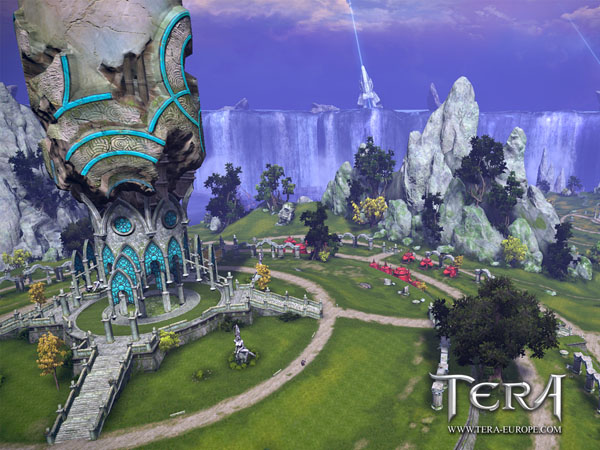Quest time
Quests centre around the usual go-kill-bad-creatures-and return-to-quest-giver paradigm or return-to-someone-further-down-the-road types, moving you along to another area. The difference, though, is that these early quests actually mean something. Instead of almost-random killing present in other games, all the quests are interlinked, keeping them interesting.
You have your standard-type levelling, run-around-and-collect, and escort-and-kill quests and anything that has a red marker moves you along the story path that everyone else is following; a simple mechanic that just plain works. All the quests though, regardless, have extra text telling an individual story arc, and the writing is good. But with the standard quests, after playing for a few hours you will simply find yourself just clicking accept without reading as it can get a little tedious wading through reams of dialogue.
Though the quests are varied, a few verge on the pointless, as the completion takes but a few seconds. For example, accept a quest and the complete-the-quest character is literally a few feet away, with the game requiring you to do without you do anything extra in between. At other times with both storyline and the standard quests, TERA will have you running back-and-forth killing the same things in both quest types, going from one end of an area map to another, and I must admit it can become a little tiring and starts to feel like a grind in the truest sense.

So whilst playing I have now found myself just grabbing all available quests, regardless of type, if they are in the locale you are currently in, and once the standard quests are complete, I immediately complete the story quest, which moves you onto the next bit of the current map; rinse and repeat. I fear for the genre a little as this is just how it works. If you’ve never done this, you’ll possibly love it. But if you’re a regular MMORPG player, you already know how it feels. I shall leave that minor gripe behind, for better lies ahead!
She's a flawed beauty
TERA is one of the best-looking MMO's I have ever seen, powered by the versatile Unreal Engine 3. Characters have plenty of detail and the scenery is absolutely stunning, moreso if the graphics card can render to the highest-quality settings. It’s worth your time to just stand and look around. Look up and you’ll see rune rings in the sky. On the Isle of Dawn there's a huge tree ever-looming in the background, and waterfalls cascade giving weight to the whole world. It is simply stunning. But, sadly, it is not without issues, and this is the downside to the Unreal Engine. Textures on the ground and walls when up-close can look a little low on detail and the draw distance in huge open spaces can be quite restrictive. At times there is texture-pop issue, when you’re up close to something, with a low-detail base layer, and then the textures start building up when you stop to have a good look.
My review rig consists of a factory-overclocked GeForce GTX 570 and AMD Phenom II 965 Black Edition CPU backed up with 8GB of DDR3-1,600 RAM, meaning there's plenty of power on tap. I have also found that, at times, after talking to a non-playing character (NPC) or going into the player's inventory you seem to get stuck on an invisible wall and have to back away from the NPC (or back away from thin air) before you can actually move forward again. I should imagine I won’t be the only one to have experienced this, and no doubt it will be addressed in a future update.

There is a large variety of creatures and demons in each zone that you will visit, and they are varied enough, with tougher versions that look slightly different the further you venture. What really stands out is one of TERA’s finest features, known as Big Ass Monsters (BAMs), and named this way by the developers. These huge creatures become a normal part of regular quests once you leave the Isle of Dawn and reach level 20. These BAMs are similar to the type of creatures you would see in a Capcom Monster Hunter game or, to a lesser extent, from Software’s Souls games. You fight two of these creatures in the prologue as part of your introduction to combat; they can deal a fair amount of damage if you don't manage to dodge a tail swipe, ground-pound or special attack, not forgetting that these huge creatures can become enraged and deal your beloved character mammoth damage. This is where the user interface, control scheme and action-orientated play style really come into their own.









